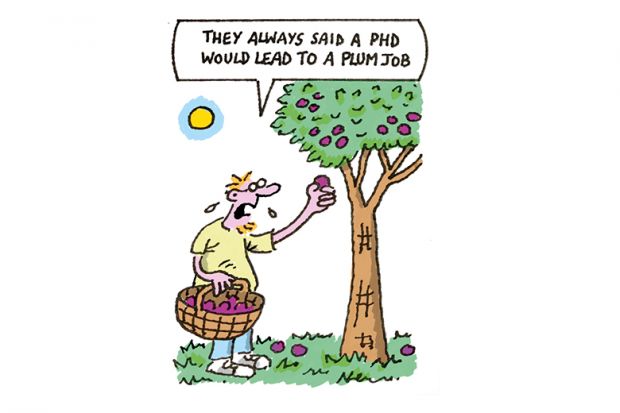Life as a PhD student is known to be one of low wages and hard work but many on the academic breadline bristled at the idea they put these skills to the test – by becoming fruit pickers. Concerned by reports that already miserly stipends are being further stretched by the cost-of-living crisis, a group at the University of East Anglia made the suggestion as part of a list of potential money-making ideas for the summer holidays. Those not happy in an orchard could instead sell cosmetics, participate in paid clinical trials or do some dog walking and babysitting, it was suggested. Academics, though, were not particularly taken with the advice, with some calling it “freaking ridiculous”. The Advanced Research and Innovation in the Environmental Sciences Doctoral Training Partnership said it was “sorry for any offence caused”. Still, with UKRI’s minimum stipend of £15,609 set to rise by only 2.9 per cent, other career choices may well start to look more appealing.
Summer holiday headlines have so far been dominated by the question of who the UK’s next prime minister will be, but one academic’s views have been conspicuously absent from the debate. Staff at the University of Leeds have reportedly been told to ignore journalists’ requests for information about John Truss, emeritus professor of mathematics and father of leadership hopeful Liz, according to the Daily Express. Despite the ban, the paper quotes an unnamed university source as saying Professor Truss is “distraught at the policies his daughter is advocating”. Asked by The Times whether her left-leaning parents would vote for her in a general election, the foreign secretary admitted: “Well, I think my mum will, I’m not sure about my dad.” Ms Truss’ major higher education intervention so far is a plan to give all students who receive three A*s at A level an automatic Oxbridge interview. There is no word yet on how this will play out around the family dinner table come Christmas.
The European Union can hardly be accused of not being ambitious enough when it comes to the creation of a “borderless market” for researchers and their work. Despite making little progress in the 22 years since the initiative was first announced, leaders signed up for almost all the planned actions to reinvigorate the still aspirational European Research Area at a summit last month. It remains to be seen how far cash-strapped research ministries will go in realising the goals, although one diplomat overseeing the process told THE some of the proposed actions were “low-hanging fruits, where we can immediately say ‘Yay, we did it’”. Despite the long to-do list, ministries were also accused of only backing topics they were already working on, which was variously interpreted as either a sign of sincerity or a slightly unadventurous approach to eliminating national borders. At least the governments can agree on something.
Much is made about the cost of going to university, but it has emerged that quite a lot has also been paid to students for not taking up their places. Nine Russell Group institutions spent nearly £9 million on creating incentives to get people to delay beginning their degrees as a result of heavily oversubscribed courses last year, according to freedom of information requests submitted by The Sunday Telegraph. Discounts on accommodation and cash were promised in a year when nearly 400,000 students – a record high – met the requirements for their top choice institution. It is not known if the practice has continued, however; because 2022-23 is the last year undergraduates can start courses before fee changes are brought in, the decision to take a gap year now may well end up being a bit more costly than saving some money on first-year digs.
With a long-held reputation as liberal hinterland, many saw the irony in the University of California, Berkeley planning to bulldoze a park that has for half a century been known as a symbol for counterculture in the Bay Area. Created in the heady days of 1969, the Berkeley People’s Park is destined to be cleared to make way for student and low-income housing after a California judge removed a final hurdle for the construction project to go ahead, the Los Angeles Times reported. City and university officials have touted their plan as a solution to both California’s homeless crisis and lack of student housing. However, locals have pledged to defend the land and, given the park itself was only created when hundreds of people occupied it in response to a previous Berkeley plan to develop the area, it may well be another 50 years until the students see their new accommodation.
Register to continue
Why register?
- Registration is free and only takes a moment
- Once registered, you can read 3 articles a month
- Sign up for our newsletter
Subscribe
Or subscribe for unlimited access to:
- Unlimited access to news, views, insights & reviews
- Digital editions
- Digital access to THE’s university and college rankings analysis
Already registered or a current subscriber? Login




